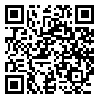BibTeX | RIS | EndNote | Medlars | ProCite | Reference Manager | RefWorks
Send citation to:
URL: http://sbrh.ssu.ac.ir/article-1-108-en.html
2- Department of psychology, University of Bojnord, Bojnord, Iran.
Background: Humor, as a form of social risk-taking is observed more frequently among individuals with risky behaviors. It seems that self-control is related to risky behaviors and humor styles. Based on the recommendations of past studies, the present study was conducted to investigate whether self-controlmediates the relationship between risk perception and risk-taking with humor styles.
Methods: The statistical population included students of Bojnord University in the academic year of 2019. A sample of 380 students was selected by stratified random sampling. They completed the humor style questionnaire, self-control questionnaire, and domain-specific risk-taking scale. The data were analyzed by SPSS software version 23 and the tests of correlation and path analysis.
Results: The results showed that adaptive humor styles were not significantly related to self-control and risk-taking; only the affiliative humor style had a negative correlation with risk perceptions. Maladaptive humor styles correlated significantly with self-control and risk-taking; only an aggressive humor style was related to positive risk perceptions. Path analysis showed that self-control affected the aggressive humor style (β = -.45, p < .0001) and self-defeating style (β = -.23, p < .0001), risk perception had a direct effect on aggressive humor style (β = .10, p < .012), and risk-taking affected the aggressive humor (β = -.19, p < .0001) and self-defeating (β = -.11, p < .016). Also, risk-taking through self-control affected aggressive humor style and self-defeating humor style significantly. The results of the goodness of fit in the modified model showed that the value of χ2, GFI, AGFI, CFI, and RMSEA were.13, 1, .99, 1, and .0001, respectively and all these indices were at an acceptable level.
Conclusion: Individuals with high self-control take more risk and use less maladaptive humor styles. Individuals with weak ability cannot control their feelings, which results in maladaptive humor styles in interpersonal relationships.
Received: 2018/12/25 | Accepted: 2020/05/4 | Published: 2020/05/26
| Rights and permissions | |
 |
This work is licensed under a Creative Commons Attribution-NonCommercial 4.0 International License. |








